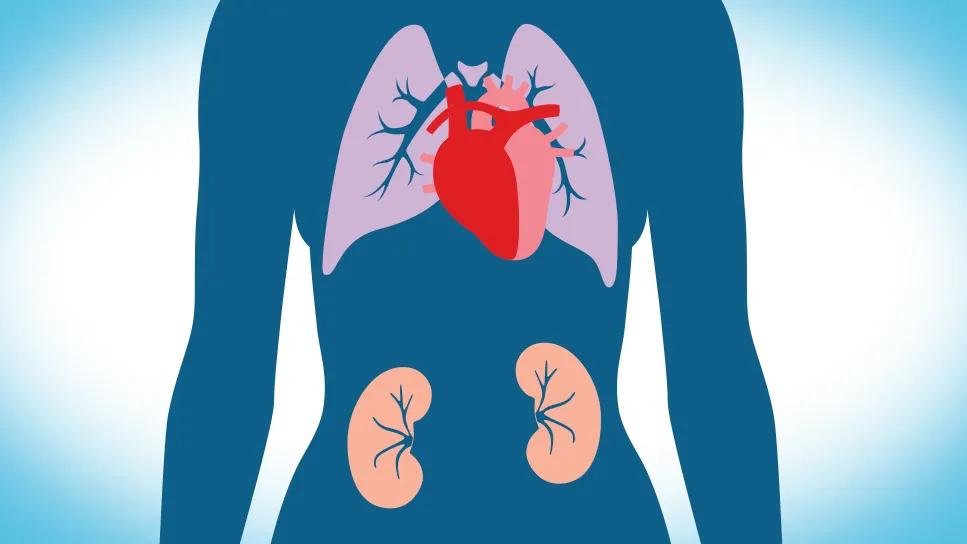Organs from HIV+ donors for eligible HIV-positive kidney transplant candidates

Cleveland Clinic’s Transplant Center will soon begin offering kidney transplantation from deceased donors with HIV to patients with end-stage kidney disease who are HIV positive. The program is part of a national effort to make transplantation more accessible to patients with HIV, according to Anita Modi, MD, associate staff in the Department of Infectious Disease in Cleveland Clinic’s Respiratory Institute.
Advertisement
Cleveland Clinic is a non-profit academic medical center. Advertising on our site helps support our mission. We do not endorse non-Cleveland Clinic products or services. Policy
“In the 1980s, the National Organ Transplant Act was passed to prevent people with HIV from donating organs,” says Dr. Modi. “At the time, HIV was devastating and we wanted to avoid inadvertent transmission to HIV-negative transplant candidates. Now, thankfully, effective medications make HIV a chronic disease rather than a death sentence, so it has become safer to offer eligible HIV-positive transplant candidates the same life-saving therapy we would offer HIV-negative transplant candidates with kidney disease.”
Dr. Modi says that even donor viral load is not necessarily a concern for organ suitability. “Data from other institutions shows that donor strains of HIV can be manageable post-transplantation, even if acquired from donors with high viral loads. In fact, many HIV-positive organs come from donors who were unaware of their diagnosis and not on therapy prior to donation. However, antiretroviral therapy is so effective now that we can most likely devise suitable regimens for transplant recipients, regardless of donor viral load.”
In 2013, federal legislation called the HOPE Act passed that opened a large donor pool only available to HIV-positive transplant candidates. “For every one person who undergoes kidney transplant, three more remain on the waitlist. This program makes transplantation much more likely for our transplant-eligible patients with HIV,” notes Dr. Modi.
Per the HOPE Act, each program must be conducted under research protocol, with local IRB approval, a data safety monitoring board, and mandatory reporting of outcomes and adverse events to the United Network of Organ Sharing and the Organ Procurement and Transplantation Network. The team created a compliant protocol and is beginning to approach HIV-positive kidney transplant candidates for enrollment.
Advertisement
“This program reflects the tremendous progress made in the last few decades in treating patients with HIV,” says Christine Koval, MD, Section Head of Transplant Infectious Diseases in the Department of Infectious Disease and principal investigator for Cleveland Clinic’s HIV donor-positive to recipient-positive kidney transplant protocol. “Our ability to host this program at Cleveland Clinic is the result of collaboration between the Department of Infectious Disease and our robust kidney transplant team, led by Drs. Alvin Wee and Emilio Poggio. We are committed to providing access to transplantation for this patient population.”
Patients with HIV have a higher risk of kidney disease and associated mortality and thus serve to significantly benefit from the life-saving therapy of kidney transplantation.
“We let patients know that being on the list for HIV-positive donor organs, in addition to remaining on the wait list for HIV-negative donor organs, could reduce their wait times for kidney transplantation,” says Dr. Modi. “We want HIV providers and nephrologists to know that their HIV-positive patients with end-stage kidney disease have this option, and we want HIV providers to tell their patients that they can be organ donors.”
The team of infectious disease and transplantation specialists hopes to begin the program in April 2021 in coordination with Lifebanc, its organ procurement organization.
To refer a patient to the program, call 216.444.6996.
Advertisement
Advertisement

Recent breakthroughs have brought attention to a previously overlooked condition

A review of treatment options for patients who may not qualify for surgery

Looking at the real-world impact and the future pipeline of targeted therapies

The progressive training program aims to help clinicians improve patient care

New breakthroughs are shaping the future of COPD management and offering hope for challenging cases

Exploring the impact of chronic cough from daily life to innovative medical solutions

How Cleveland Clinic transformed a single ultrasound machine into a cutting-edge, hospital-wide POCUS program

Collaborative patient care, advanced imaging techniques support safer immunotherapy management